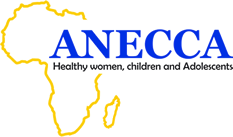- Plot 724/5, Mawanda Road, P.O Box 7484, Kampala Uganda
- +256 393 516266
- mail@anecca.org
Board of Directors established
In 2013 ANECCA got its first Board of Directors, although previously, since the beginning, there was a Steering Committee that provided strategic oversight, but because of the secretariat’s location in RCQHC, the steering committee’s powers were limited
From September 2015 to February 2017, with funding from UNICEF Uganda, ANECCA conducted country-wide assessment of services for adolescents and supported the Ministry of Health to:
- develop priority actions for accelerating and improving the quality of adolescent services.
- strengthen monitoring and evaluation of the national adolescent HIV program by conducting bi-annual quantitative data collection on adolescent HIV care and treatment services,
- develop a national Paediatric and Adolescent HIV indicator matrix;
- develop a Clinical Systems Mentorship (CSM) toolkit,
Funding from UNICEF Uganda continued from March 2017 to October 2018 to support Uganda MOH for National Level Scale up of Quality eMTCT, EIMC, Paediatric and Adolescent Health and HIV services. The key program outputs were:
- Strengthened national and subnational capacity to ensure quality, access and utilization of prevention of vertical transmission of HIV
- The percentage of HIV+ pregnant women who received ART to reduce MTCT of HIV was 96% (target was 85%),
- The percentage of infants born to HIV infected mothers who become infected at 6 weeks was 1% (target 1.9%) and after breastfeeding 5.27% (target is <5%);
- There was improved access and quality of Paediatric and adolescent HIV services (Proportion of children enrolled in HIV care services was 67%), and
- There was increased coverage of Adolescent and Early Infant Voluntary Medical Male Circumcision (43% for clients aged 15-49 years); and
- Point of Care (POC) diagnostics were integrated into Ministry of Health conventional diagnostic systems and POC policy was developed.
And from October 2018 to October 2019, again with funding from UNICEF Uganda, ANECCA supported the Ministry of Health to achieve the following outputs:
- The Ministry developed the national costed MTCT of HIV elimination plan (2019-2024)
- The Ministry conducted the national PMTCT path to elimination validation as per WHO guidance.
- It increased the number of facilities in targeted areas (37 priority districts) offering ART to adolescents aged 10-19 years from 85% to 99% (553/557).
- It conducted a formative assessment of Differentiated Service Delivery (DSD) for children and adolescents and developed appropriate DSD tools.
- The number and % of children 0-14 years diagnosed with TB (all forms) and HIV who were receiving ART increased from less than 70% to 96% in Karamoja.
- ANECCA trained 80 health workers in all the districts of Karamoja region (Amudat, Nakapiripirit, Nabilatuk, Napak, Moroto, Abim, Kotido, Kaabong and Karenga district), Soroti and Wakiso districts on Early Infant Male Circumcision using Mogen Clamps and topical anesthesia (EMLA cream) and circumcised over 1,200 newborns in a period of 3 months.
- ANECCA provided technical assistance to over 56 health facilities (with 336 health workers) in Karamoja region on HIV, TB, Laboratory services including district laboratory hubs and establishment and maintenance of Amudat Laboratory Hub.
- Working in Partnership with Central Public Health Laboratories (CPHL), ANECCA strengthened the implementation of the national Point of Care (POC) laboratory technologies (for HIV & TB) with additional focus on the Karamoja region.
From November 2015 to October 2018 ANECCA was a Principal Recipient of a regional grant of USD 3,865,587 by the Global Fund to “Catalyze Access to quality services for Children and Adolescents living with HIV” in seven counties, namely: Malawi, Tanzania, Burundi, Uganda, South Sudan, Ethiopia and Nigeria. ANECCA’s performance was consistently rated as A1 by the Global Fund for the 3 years. Information available on: https://data.theglobalfund.org/grant/QPA-ANECCA/1/performance-rating and https://data.theglobalfund.org/grant/QPA-H-ANECCA/1/
Under this grant, ANECCA was provided additional funds to support two important activities on TB/HIV in collaboration with WHO.
- A Regional consultation meeting to support country implementation of the top ten indicators to monitor the End TB Strategy, collaborative TB/HIV activities and programmatic management of latent TB infection. The meeting, held in September 2016 in Nairobi Kenya, brought together 80 participants from 11 African countries (Benin, Ethiopia, Kenya, Malawi, Mozambique, Nigeria, Swaziland, South Africa, Uganda, Tanzania, and Zimbabwe) that discussed and debated issues in introduction and implementation of the top ten indicators to monitor the End TB Strategy and identified bottlenecks.
- A Regional workshop on Understanding and tracking the TB epidemic for policy and programmatic action (5-9 December 2016 Kampala, Uganda). This meeting brought together participants from 16 countries (Cameroon, Chad, Central African Republic, Ethiopia, the Democratic Republic of the Congo, Kenya, Lesotho, Malawi, Mozambique, Namibia, Sudan, Swaziland, the United Republic of Tanzania, Uganda, Zambia and Zimbabwe) to support strengthened national surveillance and country-level analysis and use of data.
